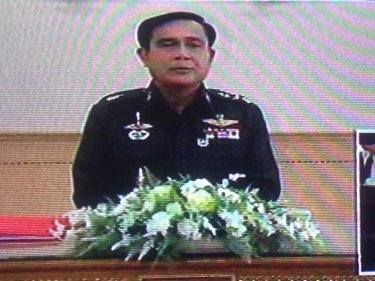He said the First Phase of two or three months would be followed by a Second Phase of approximately a year, leading up to Phase 3: democratic elections.
In a speech that lasted about 40 minutes, the general summarised the first week of control by the National Council for Peace and Order, offering justifications for the Army's actions.
He spoke of the 2014 budget and the national priorities and said the prime need was for an end to conflict and understanding that Thailand needed to move forward. The aim was ''to reduce conflicts, not promote one side,'' he said.
It was important to ''regain the trust of the people,'' he said. ''Since May 22 numbers of armed groups have been apprehended and large amounts of military grade weapons seized,'' the general told his audience.
Curfews had been eased and if the situation continues to improve, curfews will be ''shortened further in areas that have no incidents and tourist areas.''
People had been taken into custody for up to seven days to ''allow them a cooling off period'' but those who failed to report as commanded would be ''considered uncooperative'' and be prosecuted.
He said that ''differences should be discussed to find agreeable solutions.''
The previous nine years and particularly the six months of street protests had produced a major setback for the nation.
He said the 2014 budget began with the NCPO beginning to repay 92 billion to rice farmers and would continue with big projects ''considered and studied carefully.''
He said that the NCPO ''will not consider projects on the basis of popularity or political reasons, like in the past.''
The authorities were seeking to fix the prices of essential agricultural products and to increase productivity. A plan to reduce illegal workers and give opportunities to Thais was also in train, he said.
''Thailand and Thai people are still suffering many problems,'' he said.
In the Second Phase, which would begin after the first two or three months of the First Phase, reconciliation centres would be established with the Internal Security Operations Command ensuring dialogue. In this ''confrontation free'' phase the Constitution would be rewritten.
Phase Three would bring a general election under a democratic system ''legal and acceptable to all sides.''
The NCPO ''did not want power for its own benefit,'' he said. ''Democracy cannot move forward when there are conflicts.''
The general said he understood the concerns of Thailand's ''international friends.'' ''We understand we are living in a democratic world,'' he said, asking for ''time to mend our democratic system.''
The military would return to its duty once democratic elections were held, he said.





They could IMO stay there for the rest of this century.
Posted by Wilai on May 30, 2014 22:59